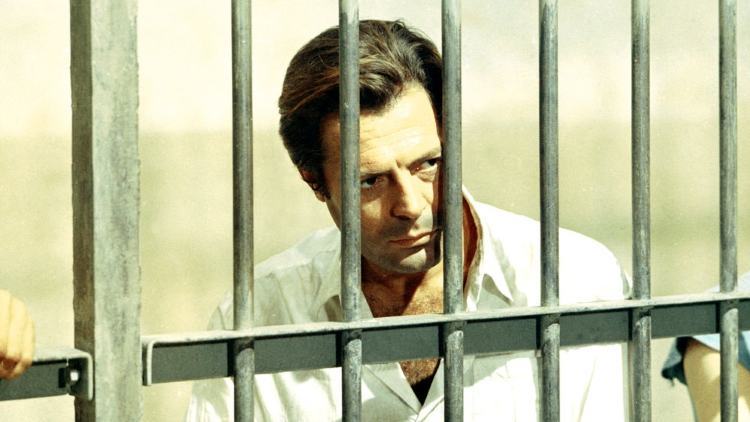The Philosophy of Time (Existentialism)

Featured image: Meursault (Marcello Mastroianni), the enigmatic antihero in Luchino Visconti's 1967 adaptation of The Stranger (Albert Camus). Meursault was able to make his experience of time flow quicker by normalising himself to the conditions of his cell: 'I realized then that a man who had only lived one day could easily live for a hundred years in prison. He would have enough memories to keep him from being bored.' Are we able to do the same? (Mariann Master/Rex, Shutterstock)
Previously on The Human Front we began a discussion on the philosophy of time. Describing time as a metaphysical concept, we had fun thinking about how we should define temporal changes in the Universe from the perspective of experience. But now a more-evocative issue is looming: our relationship with time, which is laced with existential difficulty.
As time ensues it slowly defaces the things we presently value, always running in one direction to eventually destroy them. The more we make ourselves aware of its ominous powers, the more we are spited, for we are powerless to change nature.
The Universe is indifferent to our suffering. We are small; it is grand; we are not gods.
So we have to adapt ourselves. But, as finite beings who exist on the Universe’s open plain, how do we wilfully form relationships with destruction?
Chronophobia
Time, on a personal level, scares me, forming part of an ongoing existential challenge. In our brief existences we attach ourselves to other beings, to hobbies, to places, to things, to memories—but these are swept up with time; all attachments will disappear.
Existentially, none of us really know who we are or what we should do, though we spend lifetimes searching for ourselves. Nor do we know why we’re here at all. Yet here we are. The pursuit of an authentic personal identity is doomed in its own finitudes.
‘God is dead,’ declared Friedrich Nietzsche. ‘Man’ now walks through life more uncertainly than before and more lonelily on the thin surfaces of meaning he has constructed. He walks without conviction: he is aware of the end of all things: the death of man. Whatever path he chooses, there is a perpetual threat; and when he brings it to the fore of his mind, panic and dread are induced in his senses, for time is a destructive force ever there.

I was a young boy when Armageddon (1998) was released. After watching it, I underwent my first existential crisis: the thought of an asteroid colliding with Earth sent me into a brooding state of panic. I thereafter became deeply unsettled and full of dread as I experienced emotions I couldn't comprehend. Although I had seen insects and plants die and I was superficially aware that everything must come to an end, I hadn't yet come to appreciate the finite nature of my own existence. Instead of ignoring the problem, I obsessed over asteroid strikes, dreamt about mass extinction, and thought about oceans evaporating as Earth was engulfed by the Sun, which inevitably expanded into a red giant. From bouts of anxiety I would cry as I prematurely felt the gravity of a life which will always know nothing beyond itself. While none of the aforementioned Earth-decimating events would occur for billions of years, I distinctly felt threatened now because the Universe would go on without me, without mercy. Even today my thinking is punctuated by thoughts about life's impermanence and lack of intrinsic meaning, both of which are driven by perpetual change in the Universe. But I fight to sustain meaning in my life anyway. And, despite writing this article, I try to find ways to not think about time's passing. (Buena Vista Pictures)
While we’re here, I ask, can we at least steady ourselves? I, for one, want to tackle my relationship with destruction head-on. I want to optimise my time here. I’m already questioning the whole thing; I can’t stop now.
I need my emotional disturbance to be settled. I don’t want to waste my short life being fraught by images of decay. I want to cease these thoughts and discover resolution!
I may be projecting my own angst onto you. (Okay, I definitely am.) But I reckon my existential fear of time—my chronophobia—is prevalently shared and frequently hidden. If it hasn’t shaken you, stop reading now. For everyone else, consider some remedies.
Distraction
Life promises impending loss but one solution can be found in ignorance of this: that is, in not overthinking the finite nature of things, living with a sense of illusion and imagination, and letting moments take us away. This preoccupation of ourselves, as we covered last time, bends our internal clocks. It is the reason that ‘time flies when we’re having fun’.
This isn’t about wanting more time because we’re aware of the ends: this is about tuning ourselves into a way of being that lives within itself, comfortably, without feeling punished, and allows us to be distracted. It is to consciously experience moments such that they feel timeless, embracing time’s fluidity in the present to lose ourselves in subjectivity of the past and the future.

Time is measurable, in a way. But, even though we know certain facts about time's passing, it would be existentially foolish to objectively think about time's passing any more than is necessary. We use the orbits of celestial bodies, the transitions of atoms, the curvature of spacetime, and other measurable properties of the Universe to express external change. Distraction is about calibrating ourselves to 'live in the moment' for as ignorantly long as possible, without an awareness of external change. If we allow it to, time will expand and contract in our subjective conditions, mutably and reflexively moving along with the richness of conscious experience. (Source)
We always want more time to complete projects, to relive the joys of youth, to redeem ourselves, and so on and so forth, but, as far as we’re aware, we can’t have it! However, we can engage the things we love as fully as we can, when we can.
Is this a practical solution? For when we become aware of ourselves in a moment and sense time move at its steady and predictable pace, enchantment is zapped out of experience. We need to be lost in subjectivity—our senses to lose track of time. Yet all charge is grounded eventually: transcendental moments return to their lower origins and are further spoiled by our internal narrations of what just happened.

A moment, captured on camera on 16th October 2018, from one of my favourite ever gigs. I lost myself within the experience. My consciousness stopped correlating itself with time. It was left loose and unsolid; my memory still doesn't serve me well. And, yet, to taint my experience at the time all I had to do was recognise how short-lived and replicable the events really were: the show, which was exactly 90 minutes long, was their Xth this year.
Meaning
It is not easy to stifle an incessant mind. This is particularly true for a mind concerned with grand, unchangeable properties of the Universe: namely, those of time which will eclipse everything we’ve come to know. Ironically, this is truer when we have more time on our hands. However, where basic activities fail to distract us, we can rest on meaningful distraction to subdue our fears.
Real purpose makes moments worth living through. If we are able to locate it from personal meaning in our lives, we are able to go beyond simple distraction and feel fulfilled by some greater idea than ourselves. Is it possible? This question has been asked countless times, inside and outside philosophy, and depends on how we view our place in the Universe.
In the eyes of many philosophers (Descartes, Kant, Hegel, and many others) human beings are subjects, each of whom possesses a unique and personal consciousness. The subject experiences the world outside of their ‘sense-perceptions’ with some notion of transcendence above the physical. These philosophers made the notion of subject a core concept of metaphysics, in terms of experience, but it laid the foundations for some thinkers in the realm of existential philosophy.
Experience, they tend to claim, is imbued with an irrational urge for meaning; and subjects demand that objects (entities which exist outside ourselves) provide it through the relationships we develop with them. At least, this was the take of philosophers on the side of Albert Camus; some never even distinguished subject and object, such as Freud (‘unconscious’) and Heidegger (‘Dasein’), whose worldly concepts are rooted in sexual instincts and social contexts respectively, not transcendental agency.

Martin Heidegger was more positive about there being meaning in the world than Albert Camus. Whereas Camus drew on a subjective experience of a meaningless world, Heidegger opposed the separation of subject (person) and object (world) to begin with. He claimed a meaningful existence is constituted in history and that we inherit our contexts—our meaning—from these historical situations. Hence authentic selfhood has a particular temporal structure which extends outside of ourselves; we find it by recalling the past and by conceiving of future possibility in unity, giving meaning to the present. Each of us comes from a history and is headed towards a 'fate'. In committing oneself to this unity across time, an authentic existence emerges. Heidegger would have objected to my view on time: if we obscure mortality and time from ourselves, we surrender ourselves to being inauthentic creatures. We need to feel the clock's tick to prevent alienation from the world, to dream between life's two fundamental. But, I contest, I'm searching for meaning under the humble assumption that I'm a free individual. So if I inherit my meaning, who am I? How am I free? (Source)
What does all of this mean for time? Well, let us assume that we seek to form attachments to objects.
We witness our desire for meaning, as subjects, from our faith in ideas of meaning bigger than ourselves: in spiritual beliefs (e.g. religion), in causes (e.g. political ideologies), and in belonging (e.g. sports teams). Meaning gives us reasons, as individuals, to strive for certain things. But time debases and disfigures all that we love, disempowering the control we feel over what we have in these connections. Why should we do anything if all comes to an end soon enough?
Personally, despite the terminal nature of things, I want to feel that there is a persistent meaning in my life: that my job was worth doing, that my impact on my friends and family and society was measurable, and that I have left something behind with my life’s projects.
The key, for me, is located in an ability to define the world. When I think about how things are defined for me I lose the meaning I felt, which strengthens time’s power and weakens mine. My sense of free will is snatched away as I acknowledge that my mind is built of the same stuff as yours; that, on the grander scale of the Universe’s battleground, our strengths and weaknesses are the same; that I can trace my life back to decisions, even rebellious ones, which were probable given their contexts; that, with reasonable scientific accuracy, the number of days I have left on this planet can even be predicted. I want dances of intimacy; and behind intimacy is a sense of uniqueness in a situation and a sense that time is immaterial to freely drawn interactions.

In the film In Time (2011) people stop aging when they are 25 years of age. After that they must purchase more time to stay alive. Predictably, the rich immortalise themselves, while the poor live in squalor and accustom themselves to death's proximity. Living minute by minute, Will Salas (Justin Timberlake) and Sylvia Weis (Amanda Seyfried) wage war against the system. There is arguably no time for subjectivity and meaning: being aware of time's shortage acutely renders this so as they function on survival instincts. No, actually: this project provided them with a new kind of meaning, adjusted to their shortened, life-threatening circumstances. (20th Century Fox)
The more I rationalise my situation, however, the more I realise my uniqueness is idealised. Those magical, free-spirited trips abroad that can be boiled down to chapters in Lonely Planet guides; those romances in restaurants that can be reduced to strictly 1.5 hours of foreplay; those unbounded experiences in nightclubs that were mandated to end at 3 am; those searches in computer games whose steps were programmed and delimited; those apps we use for the things we love that direct what we should write, what we should listen to, and what we should watch—the meaning we feel in each experience is predicated on a unique bond; but this bond is precarious, manufactured. In the grand picture of all events, meaning is dispelled when experience is seen for what it is: something predictable to the outside world and something controlled by external forces. And the more I realise this, the more I feel time pass around me, as I play no true part.
Rationality is my enemy.
Time keeps passing by
But it seems I'm frozen still
Scars are left behind
But some too deep to feel
And some say this can't be real
And I've lost my power to feel tonight
We're all just victims of a crime
Acceptance
Still, I contend, we can fight to define ourselves. Our lives will tumble down hills, with known beginnings and known ends, unless we fight for something in our identities, something unique to our subjectivity. So that’s what I shall do: ascend upon my own hill of meaning, without knowing what’s at the top. For passivity doesn’t sit well with me. Ignorant and distracted and purposeful, I will seek to feel in control of ‘the plan’: define things on my terms; set my future; search for reasons for doing things; my meaning to be real!
Will this work?
Again, there are certain facts I can’t avoid. I want things to be on my terms and stay but time—barefaced, a merciless law—will continue to destroy them anyway. Time is.

The cherry tree in my garden in bloom. For a few weeks I am optimistically in awe of its beauty. Rationally, however, I know this beauty won't last. This process of my becoming aware of things' temporary states disturbs my tranquil and elative moments. At the height of peace, joy, or serenity, as I admire nature in action, witness a close friend or a loved one get married, or euphorically enjoy a concert, I am submerged by my positive emotions. But I am snapped out of my mental state, unwillingly, and awoken to a reality wherein I know these moments will, soon enough, be over. I am disillusioned and knocked down by an awareness of time.
This brings me to a concept in existential philosophy known as ‘the Absurd’. Over time it slowly beckoned me to a point of embrace because my rationally born questions yielded no satisfactory answers—and I have been rewarded.
Absurdism, as a philosophical topic, draws much attention for the answers to ‘big questions’ it offers. As a general approach to the meaninglessness in life, it can teach us to find peace with life’s temporariness by accepting it.
First, we must acknowledge the Absurd conditions of life. Rarely is there much clarity in existential philosophy but, here, deep thinkers, with their profound questions, have broadly converged on what they are. Generally, they are ‘the mechanical nature of many people’s lives that lead them to question the value and purpose of their existence’, an ‘acute sense of time passing’, a ‘sense of being left in an alien world’, and a ‘sense of isolation from other beings’ (Hinchliffe 1969).
We are fundamentally irrational beings who want ‘big’ things. Absurd conditions, therefore, are ripe for a personal revolt of some sort. But against what is not clear. Answers to rational questions are absent: the offerings of science are indemonstrable; faith is tempting but not stable. Facing such voids, acceptance is our last call: i.e. the Absurd.

Albert Camus advanced the philosophy of the Absurd in his writings. He took themes such as the hopelessness of life, our need to refuse the world without renouncing it, the purity of our hearts, and happiness. His solution: revolt against the meaninglessness of the world with a magnanimous acceptance of it. (Source)
The Absurd solution, in a way, is just a coping mechanism. But through it another power is also granted, which distinguishes it from plain acceptance.
To accept our biggest state of affairs—life’s brevity—is to take personal responsibility of a particular situation: it is an attempt to break free from the cold, empty weight the Universe burdens upon us. We are provided with abject conditions but we, ultimately, get to define how we respond.
Thus it is my final choice, as a subject and a free agent, to accept time’s perpetual threat. And, more, in a pact with the void but, against Camus’ wishes, with hope atop—with power—I will continue to embellish mere chains of events with endless searches for something. Uncertain may I be, I define my response.
I describe myself now as ‘safely detached’ from the passing of time. So, if you’re interested, try it too. Don’t think about the expiration of moments and time’s ongoing movement; rather, adjust yourself to the conditions of your specific environment and, in it, preoccupy your mind with searches for meaning—however small they are. Indulge time’s fluidity within yourself as you subjectively enrichen the world, whether you’re stuck in a prison cell, reading a book, at a gig, playing a game, thinking about your job, or sharing moments with friends, remember that experiences only have to mean something to you; you don’t have to prove that to anyone else. This is your choice.
That which made me
To end these thoughts, allow me to finish with this.
Our want of more time couldn’t be any clearer. The more I think about it, the more I am spited in a slow death.
But there are remedies for our symptoms of finitude. While we can’t control the world, we can refuse to renounce the world of hope.
With modesty, we can bow to the petty forces of distraction by blinding ourselves to time’s measurable passing. With acceptance of our surroundings, we can still search for personal meaning within our contexts. The Universe is ruthless and moves with unfathomable plans to spite our quests for meaning in it. However, we are powerful enough to busy ourselves with the unfixable shards it leaves behind: to be in a state of constant departure while never arriving.
To quote Søren Kierkegaard:
I am well aware of what time has coming for me. But, without further reflection than what I’ve already set forth, in the time I have left, I shall move unknowingly with the currents that made me.
The Stranger (excerpt) by Albert Camus
'Maman used to say that you can always find something to be happy about. In my prison, when the sky turned red and a new day slipped into my cell, I found out that she was right … I would always begin by assuming the worst: my appeal was denied. "Well, so I'm going to die." … In fact, nothing could be clearer. Whether it was now or in twenty years from now, I would still be the one dying. At that point, what would disturb my train of thought was the terrifying leap I would feel my heart take at the idea of having twenty more years of life ahead of me. But I simply had to stifle it by imagining what I'd be thinking in twenty years when it would all come down to the same thing anyway …
'I woke up with the stars in my face. Sounds of the countryside were drifting in. Smells of night, earth, and salt were cooling my temples. The wondrous peace of that sleeping summer flowed through me like a tide. Then, in the dark hour before dawn, sirens blasted. They were announcing departures for a world that now and forever meant nothing for me. I [now] felt as if I understood why at the end of her life [my mother] had taken a "fiance," why she had played at beginning again. Even there, in that home where lives were fading out, evening was a kind of wistful respite. So close to death, Maman must have felt free then and ready to live it all again … And I felt ready to live it all again too. As if that blind rage had washed me clean, rid me of hope; for the first time, in that night alive with signs and stars, I opened myself to the gentle indifference of the world.'
Ending thoughts
Time is gelled into pointless moments.
The rational mind seeks meaning—tries to numerate and enhance its soundings. It fails. Active searches find no answers.
Hope in reason is a protest that leads to misery: whether punishment is now or in the future, punishment, in death, awaits.
Do things anyway.
Time moves us smoothly and meaningfully when we yield to its currents. The task is to assert simplicity again. Meaning emerges from this arbitrary world when we live comfortably within the conditions it emptily provides.
Time, unnoticed, loosens and sets us free.
